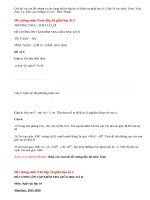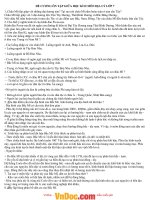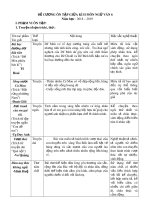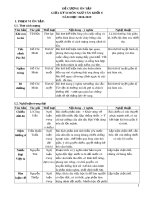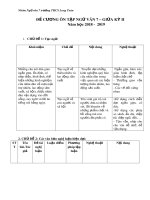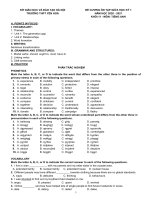ĐỀ CƯƠNG ÔN TẬP GIỮA HỌC KÌ 2 TIẾNG ANH 8 THÍ ĐIỂM
Bạn đang xem bản rút gọn của tài liệu. Xem và tải ngay bản đầy đủ của tài liệu tại đây (994.95 KB, 20 trang )
1
1
If + S + V(HTĐ), S + V (HTĐ)
Chân lý, sự thật hiển nhiên
Type
0
If you don’t eat, you are hungry.
If + S + V(HTĐ), S + will/ can/ may +V-INF
Giả định điều CÓ THỂ XẢY RA ở HIỆN TẠI hoặc TƯƠNG LAI
Type
1
If I meet him tomorrow, I will tell him about the truth..
If + S + V(QKĐ), S + would/ could/ might +V-INF
Type
2
Giả định điều TRÁI với sự việc ở HIỆN TẠI.
If I were you, I would go to the dentist.
(Lưu ý: trong MĐ IF, động từ tobe của chủ ngữ là she/ he/ I là “were”
If + S + had (not) + V3/ed, S + would/ could/ might + have
+ V3/ed
Type
3
Giả định điều TRÁI với sự việc ở QUÁ KHỨ.
If it hadn’t rained yesterday, we would have gone swimming.
If + S + had (not) + V3/ed, S + would/ could/ might + V-INF
Nguyên nhân trong quá khứ dẫn tới kết quả ở hiện tại
(MĐ if: nguyên nhân, MĐ chính: kết quả - thường đi với NOW)
If it hadn’t got wet yesterday, we wouldn’t be sick now.
mixed
CÔNG THỨC CHUNG
ACTIVE:
PASSIVE:
S+V +O
S + be + V3/ed + by O
1. SIMPLE (PRESENT, PAST) – HIỆN TẠI/ QUÁ KHỨ ĐƠN
PASSIVE:
S + tobe + V3/ed + by O
E.g: 1. Mary studies English every day.
English is studied by Mary every day.
2. He wrote a letter yesterday.
A letter was written yesterday
2. CONTINUOUS (PRESENT, PAST) – HIỆN TẠI/ QUÁ KHỨ TIẾP DIỄN
PASSIVE:
S + tobe + being + V3/ed + by O
E.g: 1. He is planting some trees now.
Some trees are being planted now.
2. They were repairing their car at 9am yesterday.
Their car was being repaired at 9am yesterday.
3. PERFECT (PRESENT, PAST) – HIỆN TẠI/ QUÁ KHỨ HOÀN THÀNH
PASSIVE:
S + have/ has/ had + been + V3/ed + by O
E.g: 1. They have sent that money to the poor families.
That money has been sent to the poor families.
2. She has read those books for 3 times.
Those books have been read for 3 times.
3. Mr. Trung had used the computer before he met you.
The computer had been used by Mr. Trung before he met you
4. PERFECT CONTINUOUS (PRESENT/ PAST) - HIỆN TẠI/ QUÁ KHỨ HOÀN THÀNH
TIẾP DIỄN
PASSIVE:
E.g:
S + have/ has/ had + been + being + V3/ed + by O
1. John has been repairing this car for 2 hours.
This car has been being repaired by John for 2 hours.
2.. I have been repairing my watches for more than 3 hours.
My watches have been being repairing for more than 3 hours.
3. I had been typing the essay for 2 hours before I went out with my friends.
The essay had been being typed for 2 hours before I went out with my
friends.
5. MODAL VERBS (WILL, MUST, HAVE/HAS/HAD TO, MAY, MIGHT, SHOULD, SHALL,
WOULD, CAN, COULD); TOBE GOING TO; USED TO
PASSIVE:
E.g:
S + modal verb/ tobe going to/ used to + be + V3/ed + by O
1. All his friends will meet him at the airport tomorrow.
He will be met at the airpot by all his friends tomorrow
2. She is going to send you the contracts tonight.
You are going to be sent the contracts tonight.
3. We must finish our homework before 9pm.
Our homework must be finished before 9pm.
4.He used to teach the children in that village.
The children in that village used to be taught English.
WORDS/ PHRASES INDICATING CAUSES - EFFECTS
TỪ/ CỤM TỪ CHỈ NGUYÊN NHÂN- HẬU QUẢ
REVIEW 1
Choose the letter A, B, C or D the word that has the underlined part different from
others.
1. A. visual
B. state
C. scatter
D. scenic
2. A. billboard
B. symbolize
C. icon
D. mudslide
3. A. pollutant
B. contaminated
C. evacuate
D. waste
4. A. polluted
B. died
C. flooded
D. evacuated
5. A. pollutes
B. lakes
C. causes
D. evacuates
Choose the word which has a different stress pattern from the others.
1. A. injure
B. shelter
C. erupt
D. accent
2. A. property
B. tsunami
C. hurricane
D. natural
3. A. medical
B. emergency
C. official
D. pollution
4. A. evacuate
B. temporary
C. technology
D. photography
5. A. evacuation
B. poinsonous
C. archaeology
D. environmental
Choose the best answer A, B, C or D to complete the following sentences
1. Air __________ is causing many environmental problems in our cities today.
A. pollute
B. pollution
C. polluting
D. polluted
2. If you can speak English, you __________ able to go to Canada.
A. will be
B. will
C. were
D. are
3.The road in front of my office is always __________ when it rains heavily.
A. to flood
B. flooding
C. flood
D. flooded
4. Singapore is famous for its __________ and green trees.
A. cleanliness
B. cleanly
C. cleaning
D. clean
C. came
D. will come
5. After I __________ in the room, she left.
A. come
B. had come
6. This is one of the worst volcanic __________ in this year.
A. eruptio
B. erupt
C. erupting
D. eruptive
7. The roof of the building __________ in a storm a few days ago.
A. has beendamaged
B. was damaged
C. has damaged
D. damaged
8. In some English speaking countries, turkey is __________food at Christmas.
A. national
B. historical
C. traditional
D. possible
9. The teachers show me how to ________ the environment.
A. protect
B. write
C. make
D. recycle
10. The last typhoon resulted ___________ terrible loss of lives.
A. in
B. on
C. for
D. of
11. English is the ___________ language of many countries such as the US, the UK, and
Australia.
A. international
B. usual
C. popular
D. official
12. Poisonous ___________ from factories can kill a lot of wildlife animals.
A. things
B. animals
C. chemicals
D. nations
13. People in the flooded area have ___________ to a safer place.
A. evacuating
B. been evacuated
C. evacuated
D. evacuate
C. No, thanks.
D. Not at all.
14. Would you mind opening the door?
A. Yes, I would.
B. No, I wouldn't.
15. When the policeman came to the scene, the driver of the car __________.
A. have left
B. had left
C. leaves
D. was left
Put the verbs in the blanket into the correct form
1. The pollution water results in the _________ of many aquatic
animals and plants.
2. My friend and I are going to give a presentation about our
____________________ problems.
3. Both Chinese and English are __________________ languages in
Vietnam.
4. People should become familiar with the guidelines for
____________ because natural disasters can force them to leave their
homes.
5. Natural disasters can be very ____________ .
(DIE)
(ENVIRONMENT)
(OFFICIAL)
(EVACUATE)
(DESTROY)
Read the passage and choose the correct answer.
Ha Tinh is a disaster-prone province in the central of Viet Nam. Since the beginning of
2015, this province has experienced three massive floods, causing devastating property
damage. The floods razed thousands of homes, damaged numerous irrigation works,
roads, schools and healthcare centres. Ms. Nga Tran, a local resident, recalled the last flood,
“The flood in June was normal, but the one in September was awful. Water from Ngan Pho
River began to submerge the floor, while outside it was still raining heavily. After a while
the water was about one meter. I had no choice but to climb up to the attic and stay there
for two days.” Like many other residents, all of Ms Nga’s furniture was covered in mud,
some was completely damaged for having been soaked in the water for too long. But what
worried her most was the loss of her rice crop. Three months after the flood, lots of
farmers still struggled with finding enough food to eat. If there is no aid from the
government, the situation in this province will get worse.
1. What does disaster-prone mean?
A. having no disasters
B. likely to have disasters
C. have very few disasters
2. What is NOT mentioned as consequences from the floods?
A. loss of life
B. loss of property
C. loss of crop
3. When was the flood as recalled by Ms. Nga Tran?
A. January
B. June
C. September
4. How long did Ms. Nga Tran stay in her attic?
A. for the whole week
B. two days
C. three months
5. What is the biggest worry of Ms. Nga and other residents?
A. lack of food
B. lack of accommodation
C. lack of aid
Choose the letter A, B, C or D to complete the passage below
Water pollution happens __________ (1) toxic substances enter water bodies such as lakes,
rivers, oceans and so on, getting dissolved in them, lying suspended in the water or
depositing on the bed. This degrades the quality of water. Not __________ (2) does this spell
disaster for aquatic ecosystems, the pollutants also seep through and reach the
groundwater, which might end up in our households as contaminated water we use in our
daily activities, including drinking.
Water pollution can be __________ (3) in a number of ways, one of the most polluting being
city sewage and industrial waste discharge. Indirect sources __________ (4) water pollution
include contaminants that enter the water supply from soils or groundwater systems and
from the atmosphere via rain. Soils and groundwater contain __________ (5) residue of
human agricultural practices and also improperly disposed of industrial wastes.
Pollutants can be of varying kinds: organic, inorganic, radioactive and so on. In fact, the list
of possible water contaminants is just too vast to be listed here.
1. A. what
B. when
C. why
D. while
2. A. both
B. only
C. well
D. either
3. A. cause
B. caused
C. causing
D. causes
4. A. of
B. in
C. at
D. for
5. A. a
B. an
C. the
D. x
Rewrite the second sentence so that it has a similar meaning with the first one
1. Air pollution can cause breathing problems.
Breathing _____________________________________________________
2. Study hard or you won’t pass the exam.
If ____________________________________________________________
Write full sentences using the suggested words and phrases (1pt)
1. If/ I/ be/ you/ I/ buy/ that house.
______________________________________________________________
2. The last/ time/ he/ speak/ his father/ be/ two months ago.
______________________________________________________________
------------------------------THE END -----------------------------REVIEW 2
I. Choose the word that has underlined part pronounced differently from the rest.
1. A. icon
B. visual
C. scenic
D. disaster
2. A. flood
B. typhoon
C. kangaroo
D. foot
3. A. parade
B. rage
C. earthquake
D. climate
4. A. source
B. visit
C. castle
D. station
5. A. dead
B. health
C. great
D. heavy
II. Choose the word that has different stress pattern.
1. A. paradise
B. exhibit
C. invention
D. excursion
2. A. medical
B. natural
C. kangaroo
D. visitor
3. A. volcanic
B. refugee
C. contaminate
D. tsunami
4. A. evacuate
B. emergency
C. biography
D. economic
5. A. rescue
B. damage
C. collapse
D. illustrate
III. Choose the best answer a, b, c or d to complete the sentence.
1. Air pollution has many effects_________ the environment and living organisms.
A. in
B. of
C. for
D. on
2. The volcano has erupted approximately once every ten years_________ 1970.
A. since
B. in
C. from
D. for
3. After a severe storm, there is often_________ along the shore that will need to be removed.
A. waste
B. debris
C. lava
D. junk
4. In the 1980s, acid rain_________ widespread damage to forests in the areas.
A. made of
B. resulted in
C. led for
D. caused by
5. _________ plastic takes so long to break down, it pollutes the land and water.
A. Even though
B. While
C. Since
D. Because of
6. If I had the chance to take part in an International summer camp, I_________ very excited.
A. am
B. was
C. will be
D. would be
7. _________ do earthquakes usually last? - Less than one minute.
A. How strong
B. How long
C. How often
D. How far
8. Niagara Falls is a great natural_________ on the border of the USA and Canada.
A. castle
B. loch
C. spectacle
D. Symbol
9. The 2010 Haiti earthquake was the most_________ natural disaster in the history of this
country.
A. destructive
B. permanent
C. unique
D. awesome
10. “A hurricane is heading toward our home town.” - “_________”
A. That’s a relief.
B. How interesting! C. Glad to hear.
D. Oh my God!
11. The earthquake caused damage_________ property estimated at $6 million.
A. for
B. with
C. on
D. to
12. The_________ picked up the car and threw it 100 meters into the air. That’s an incredibly
strong wind!
A. volcanic eruption
B. tornado
C. landslide
D. typhoon
13. __________ having two official languages, Canada has the third largest English-speaking
population.
A. Despite
B. Because
C. Due to
D. Even though
14. The inhabitants of Scotland are called__________.
A. Scotlanders
B. Scotlish
C. Scots
D. Scotchs
15. The levels of carbon dioxide in the atmosphere have risen________ the burning of fossil
fuels.
A. therefore
B. because
C. in spite of
D. due to
IV. Choose the underlined word or phrase, A, B, c or D that needs correcting.
1. A heatwave can lead in widespread drought and increase the risk of wildfires.
A
B
C
D
2. Homeless people may be offered temporary accomodation by the council.
A
B
C
D
3. The Sydney Opera House is a symbolize for not only a City, but a whole country
and continent.
A
B
C
D
4. Noise pollution is thought having less damage to humans than water or air pollution.
A
B
C
D
5. If people keep cutting down trees and they wipe out forests, there will be more floods.
A
B
C
D
6. Have you come home before the tornado touched down this afternoon?
A
B
C
D
7. The timetable shows that the next bus will leave in ten minutes.
A
B
C
D
8. Since the volcano last erupted, many houses have built on its slopes.
A
B
C
D
9. Despite of their usefulness, pesticides could pose potential risks to food safety.
A
B
C
D
10. If people didn’t use cars, there will be much less pollution.
A
B
C
D
V. Write the correct tense or form of the verbs in brackets.
1. Alex __________________ (not do) the gardening before it started raining.
2. The amount of plastic in the ocean __________________ (increase) if we __________________ (not
take) action now.
3. Outdoor air pollution __________________ (cause) more than 3 million deaths a year.
4. There __________________ (be) more than 80,000 wildfires so far this year.
5. What would you do if you __________________ (catch) in a hurricane’s path?
6. By the time Hurricane Gilbert __________________ (hit) Mexico it __________________ (change)
characteristics.
7. Heavy rains __________________ (lash) the coast of Orissa and Andhra Pradesh in 2013.
8. In the early morning hours, tornado warnings __________________ (issue) for storms in
Oklahoma.
9. Water pollution makes aquatic plants and animals __________________ (die).
10. Survivors said that many people managed __________________ (escape), but they could not
run away fast enough.
VI. Supply the correct form of the words in brackets.
1. A natural disaster can cause __________________ of life or property (LOSE)
damage.
2. Human greenhouse gas emissions are causing __________________ (GLOBE)
warming.
3. Kangaroos and koalas are only __________________ to Australia.
(NATION)
4. Hurricane Katrina was one of the __________________ hurricanes ever (DEAD)
to hit the United States.
5. Filters do not remove all __________________ from water.
(CONTAMINATE)
6. Freak tornado __________________ leaves trail of in its wake.
(DESTROY)
7. __________________ appeal to the government to enact laws to stop (ENVIRONMENT)
factories from discharging toxic chemicals into the sea.
8. Toxic pollution is contaminated water, soil, and air that is (POISON)
__________________.
9. Pollution kills more people than both war and __________________.
(VIOLENT)
10. English is the most widely __________________ language worldwide, (SPEAK)
with 1.5 billion speakers.
11. It’s evidence that this ocean is clean and environmentally (POLLUTE)
________________.
12. Diseases are primarily due to ________________ food and air.
(CONTAMINATE)
13. While some Chemicals may be harmless others can cause (DAMAGE)
________________.
14. Life expectancy has gone down due to ________________ diseases (DIE)
caused by air pollution.
15. In remote regions, the air is pure and the crops are free of (POISON)
________________ insecticides.
16. Some scientists warn that light ________________ damages people (POLLUTE)
and animals.
17. Many Chemicals have a ________________ effect on the environment.
(DAMAGE)
18. The dumping of ________________ sewage into the sea is a source of (TREAT)
ocean pollution.
19. A ________________ is a substance that makes something dirty, (CONTAMINATE)
polluted, or poisonous.
20. Water pollution can lead to the ________________ of aquatic plants (DIE)
and animals.
21. As an________ why do you oppose banning plastic bags?
(ENVIRONMENT)
22. The radiation leak has had a ________________ effect on the (DISASTER)
environment.
23. The water supply is being tested for ________________.
(CONTAMINATE)
24. __________________ men don’t wear a skirt but rather a kilt, a product (SCOTLAND)
of the Gaelic heritage.
25. It is claimed that the __________________ were the first discoverers of (PORTUGAL)
Australia.
26. Flags __________________ nations, not languages.
(SYMBOL)
27. The Eiffel Tower is the most __________________ Parisian landmark.
(ICON)
28. The natural __________________ beauty of Thodupuzha has attracted (SCENERY)
many Malayalam movie makers.
29. Which countries have the most English __________________?
(SPEAK)
30. English is recognised as an __________________ language in a total of (OFFICE)
67 different countries.
VII. Read the passage carefully, then do the tasks.
A magnitude-9.0 earthquake, also known as the Great East Japan Earthquake, struck in the
Pacific Ocean off the northeast coast of Japan’s Honshu island on March 11, 2011. It was
the most powerful earthquake ever to hit Japan and the fourth largest ever recorded in the
world. The earthquake triggered a massive tsunami that flooded more than 200 square
miles of Coastal land. Waves estimated to be as high as 38 meters, the height of a 12-story
building, tore apart Coastal towns and villages, carrying ships inland as thousands of
homes were flattened, then washed tons of debris and vehicles back out to sea. Damage to
the reactors at TEPCO’s Fukushima Daiichi Nuclear Power Plant then caused a third
disaster, contaminating a wide area that still forces nearly 100,000 residents to live as
evacuees. Tsunami waves also swept across the Pacific, causing damage or disruptions in
Hawaii, California, Oregon, Washington and British Columbia. Casualties from the
earthquake and tsunami in Japan may be 30,000 and close to 500,000 people were forced
to evacuate. More than 125,000 buildings have been washed away or seriously damaged;
property damage is estimated to be more than $310 billion.
A. Decide whether the following sentences are true (T) or false (F).
1. A magnitude-9.0 earthquake struck offshore of Japan on March 11, 2011.
2. This earthquake was the world’s largest recorded quake.
3. Tsunami waves caused by the earthquake smashed the coast, causing massive damage
and flooding.
4. As the waves retreated back to the sea, they carried ships with them.
5. The tsunami damaged the Fukushima Daiichi reactors, causing a nuclear disaster.
6. About 500,000 people within the nuclear evacuation zone were evacuated.
7. An estimated 30,000 people were killed by the 2011 earthquake and tsunami.
8. Property damage from the earthquake and tsunami is estimated over $310 billion.
B. Answer the questions.
1. Where did the earthquake strike?
____________________________________________________________________
2. What caused the tsunami?
____________________________________________________________________
3. What was the height of tsunami waves?
____________________________________________________________________
4. How many people were evacuated?
____________________________________________________________________
5. What regions were also affected by the tsunami?
____________________________________________________________________
VII. Write the second sentence so that it has the same meaning to the first one.
1. Pollution affects the environment in many ways.
The environment _______________________________________________________
2. Some farmers are overusing chemicals in their crops.
Chemicals____________________________________________________________
3. Don’t leave the tap running while brushing your teeth, or you will waste water.
If you________________________________________________________________
4. The weather is bad, so we can’t go hiking in the mountains.
If the weather__________________________________________________________
5. It’s my opinion that you should study English in the UK.
If ____________________________________________________________________
6. Global warming will affect specific regions in different ways.
Specific regions________________________________________________________
7. It’s two years since the Hawaii volcano erupted.
The Hawaii volcano_____________________________________________________
8. As the world’s temperatures rise, the Arctic keeps losing its ice.
Due to_______________________________________________________________
9. Due to the hurricane last night, I was without electric power.
Since there ___________________________________________________________
10. Air pollution deaths will double by 2050 if nations don’t act.
Unless_______________________________________________________________
